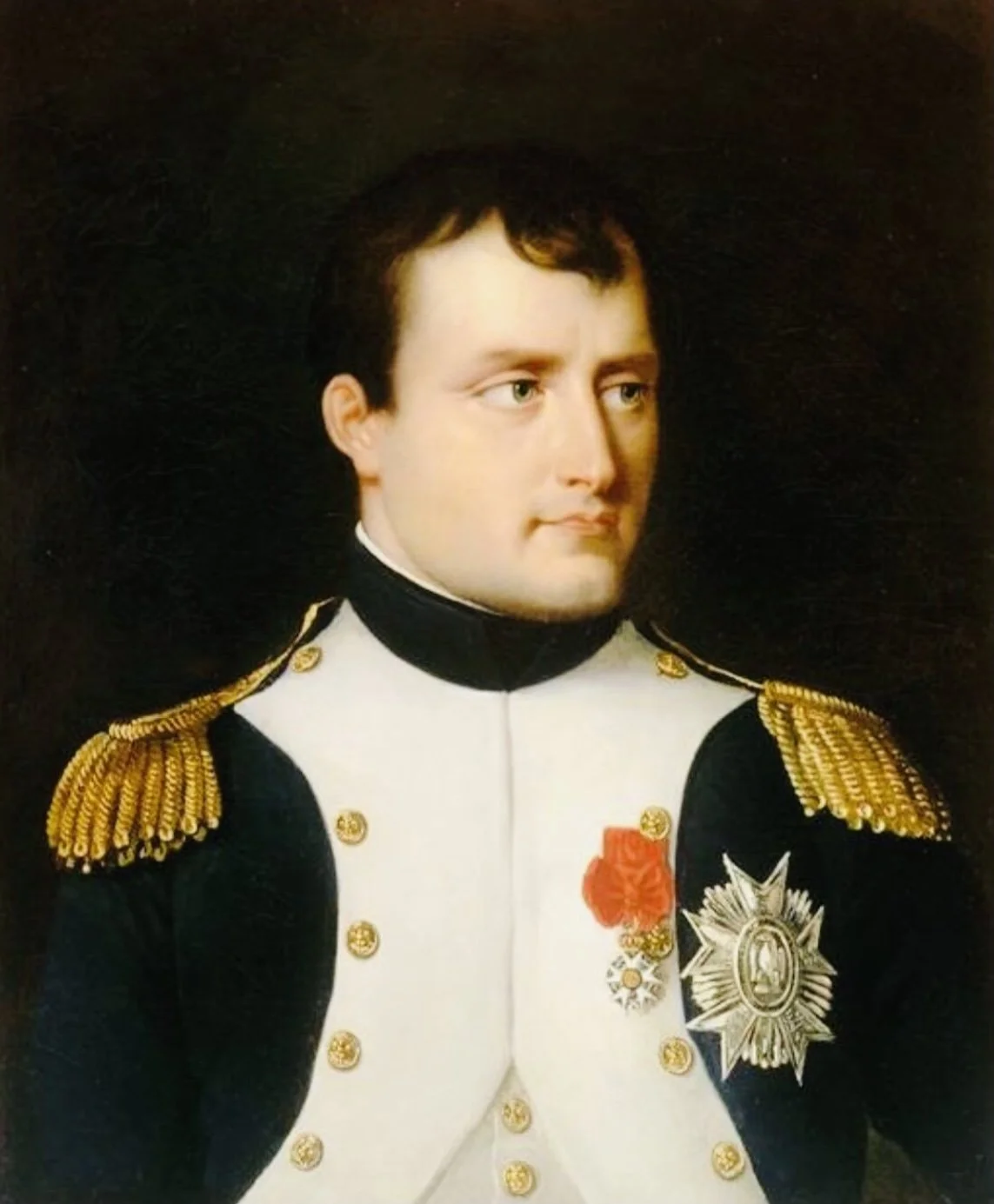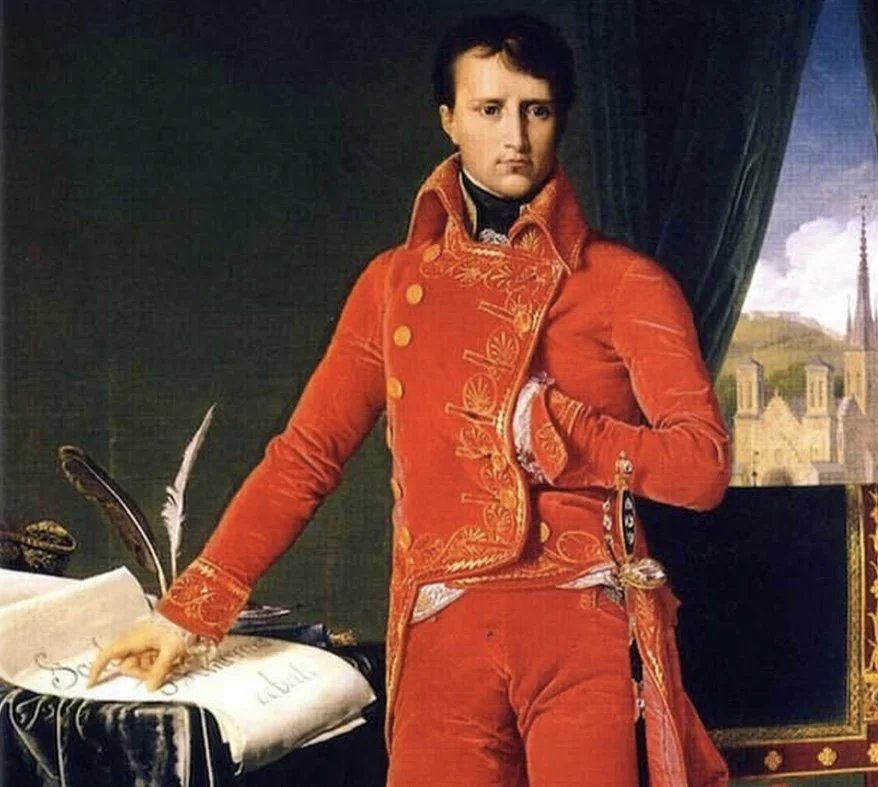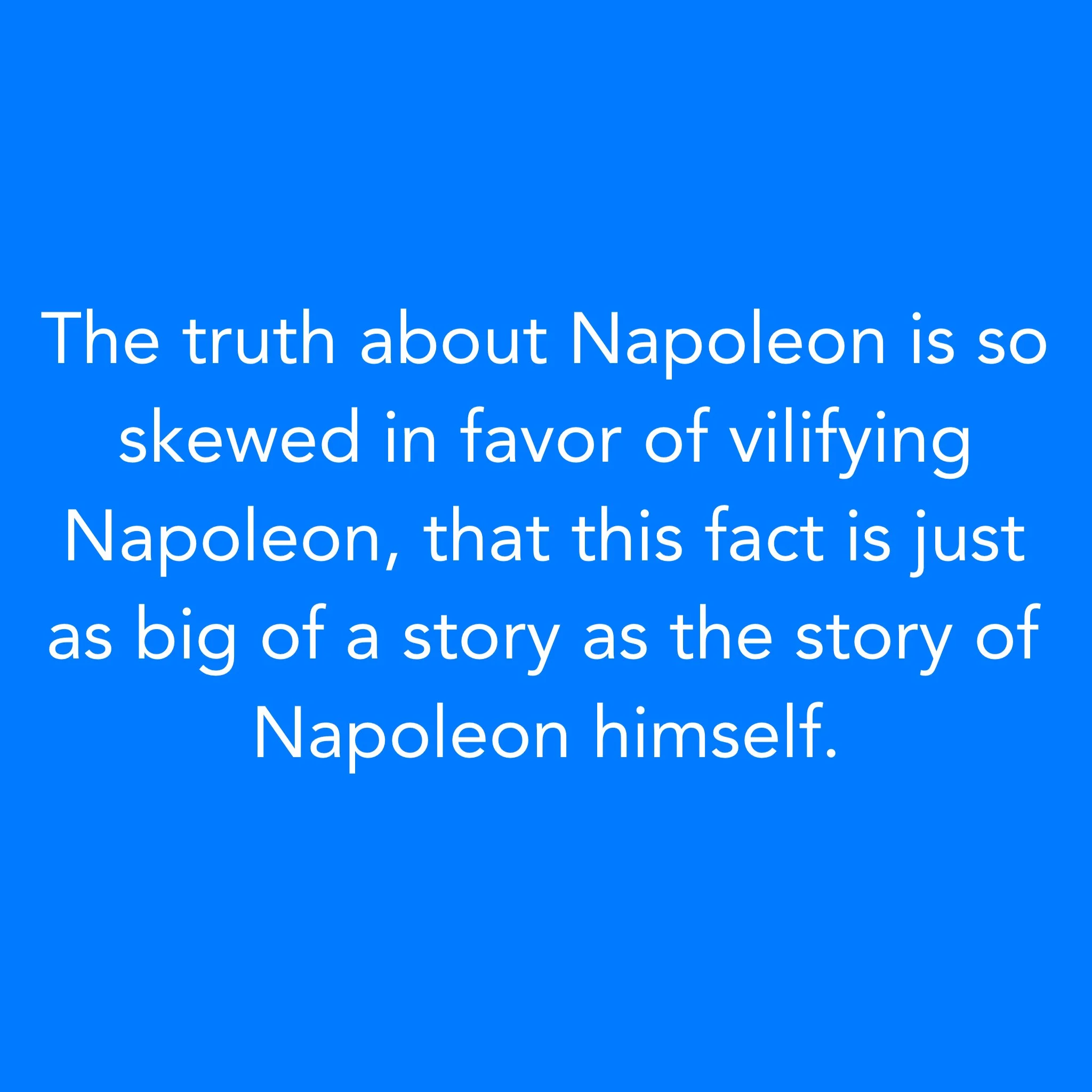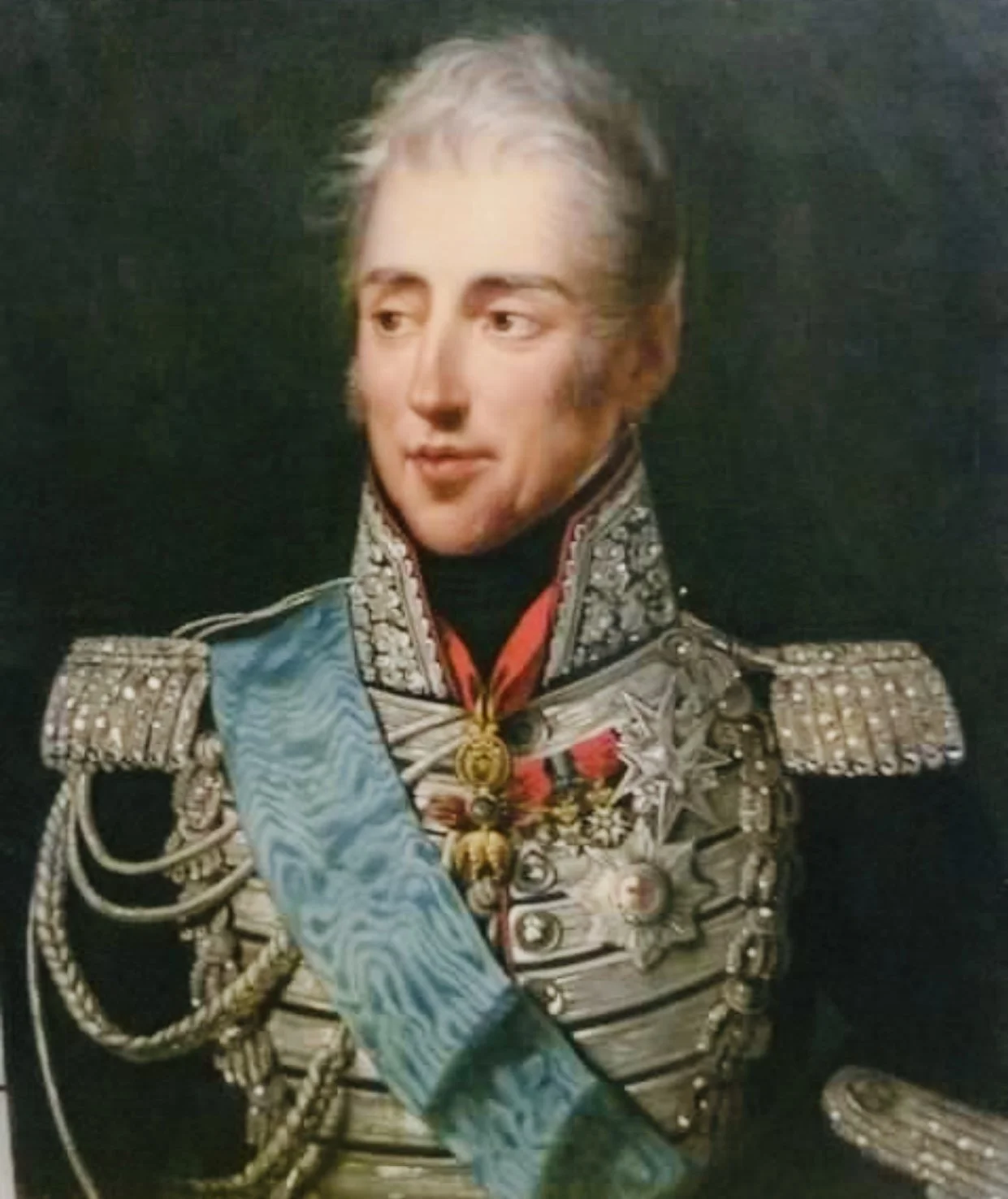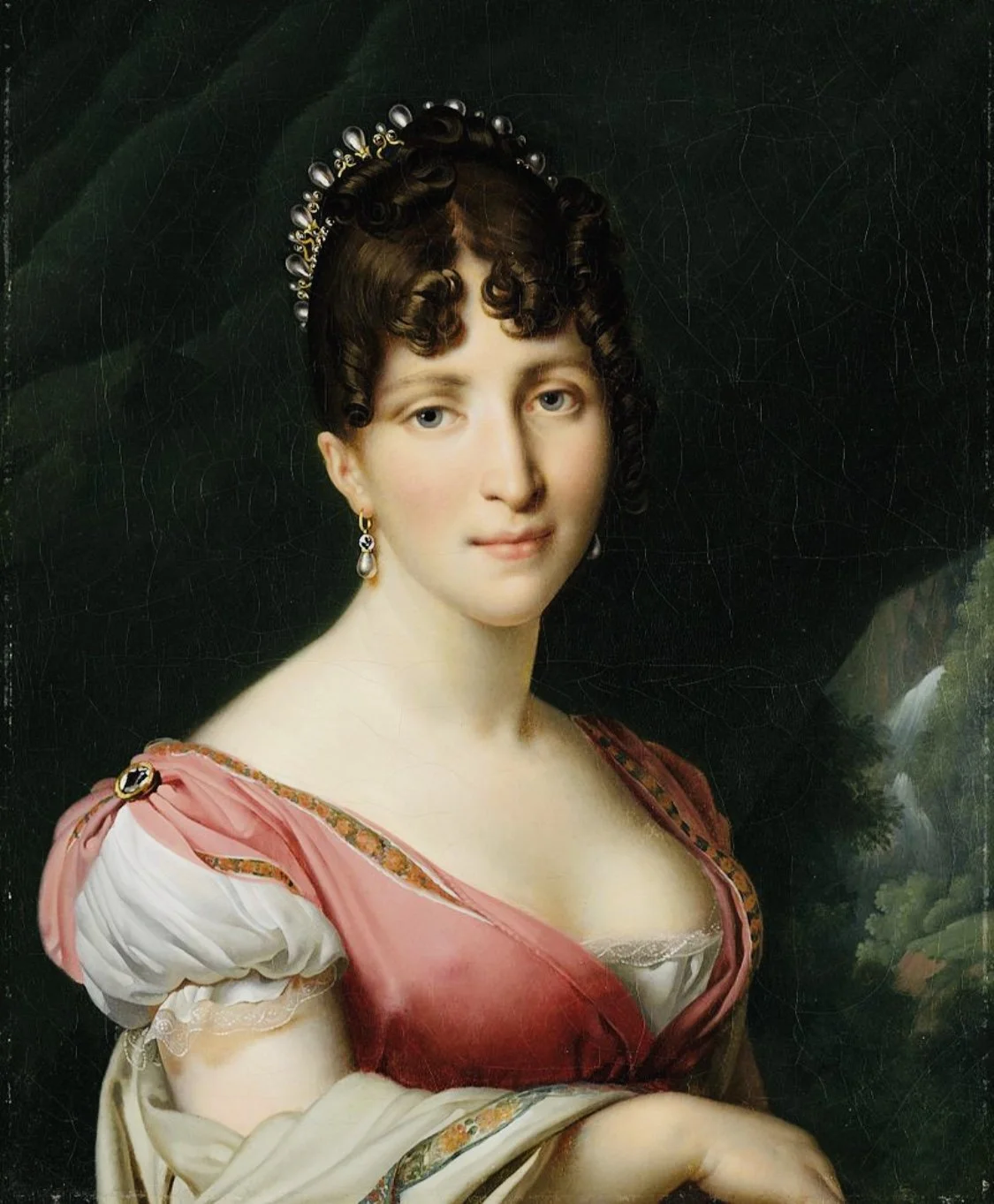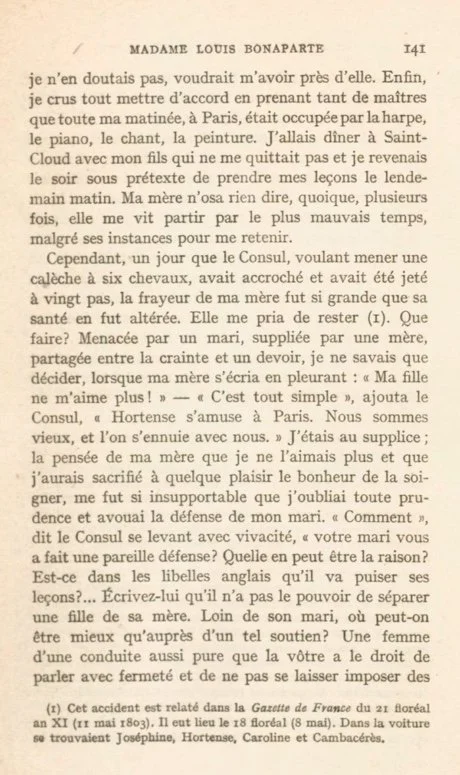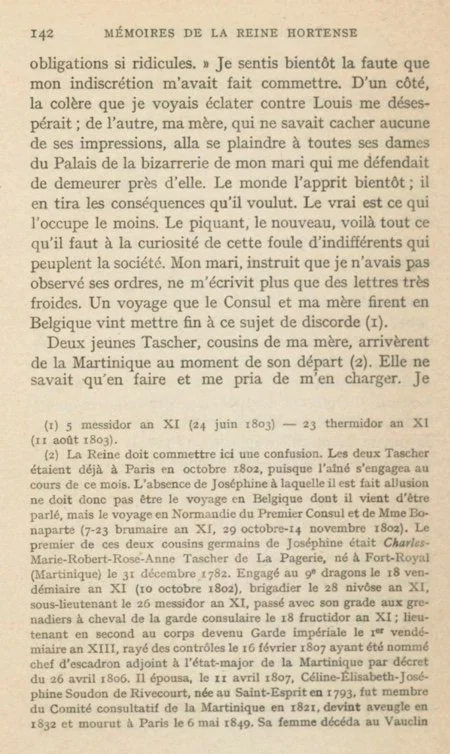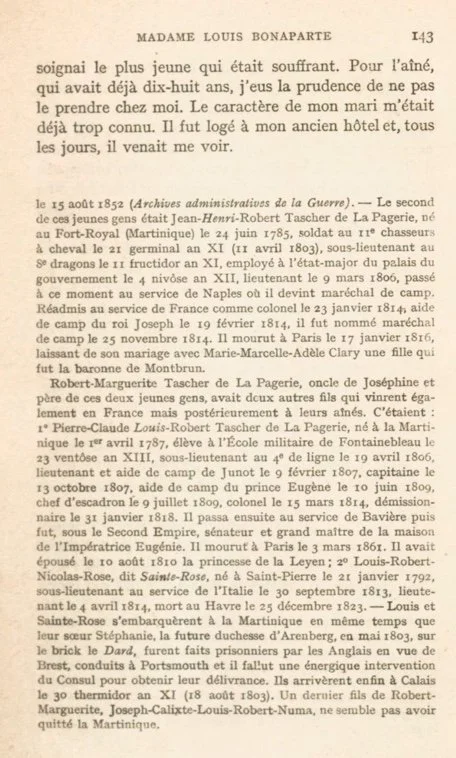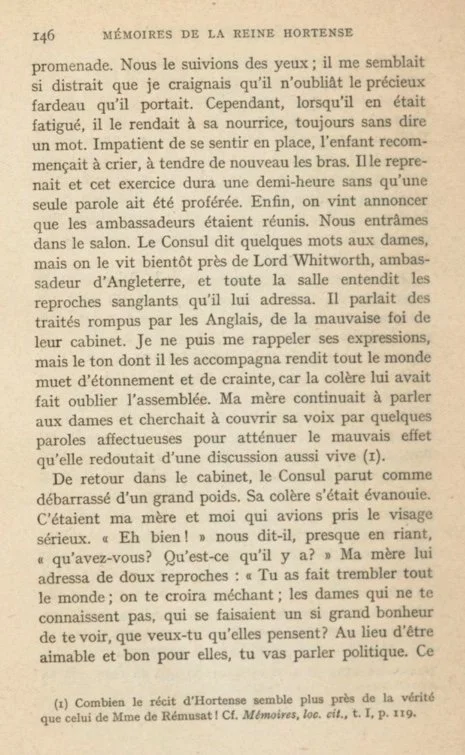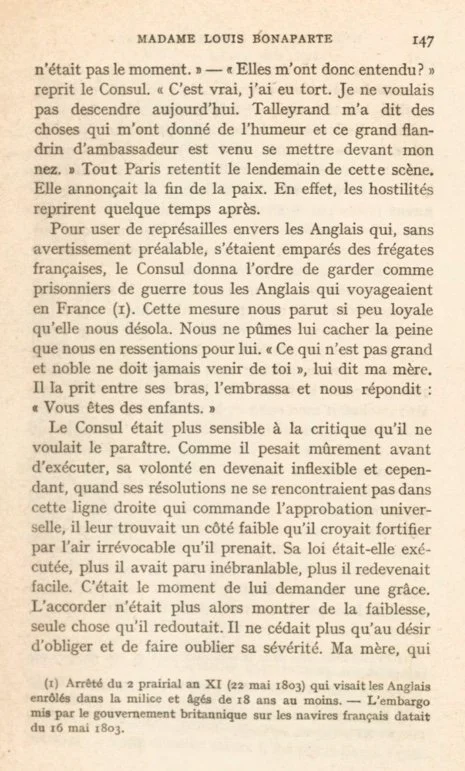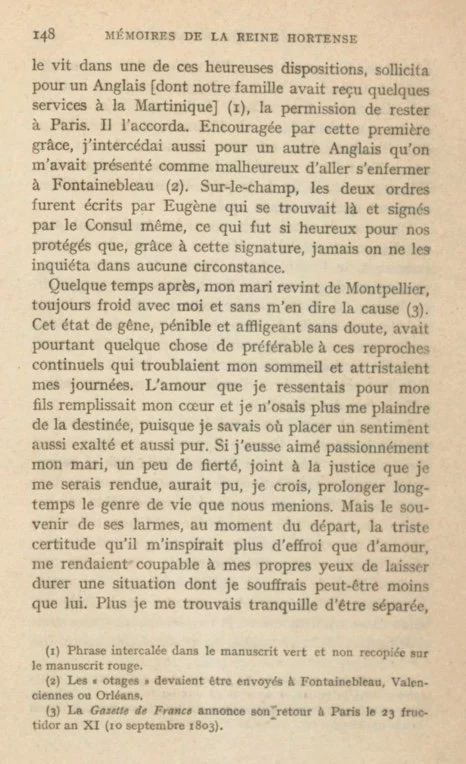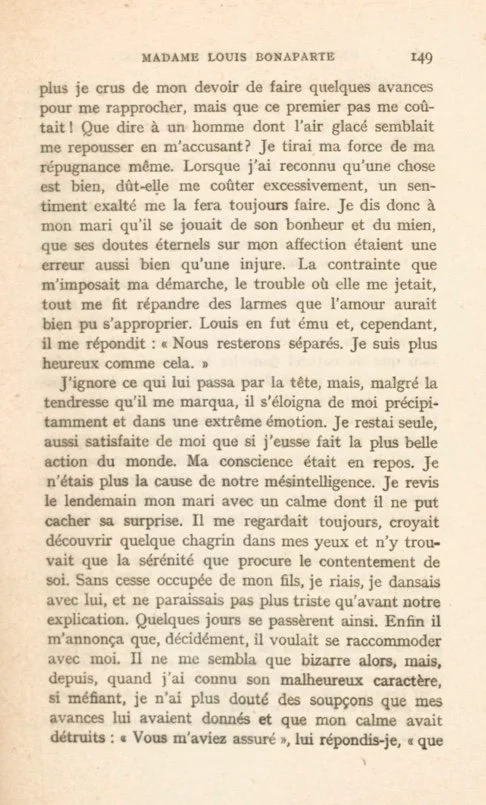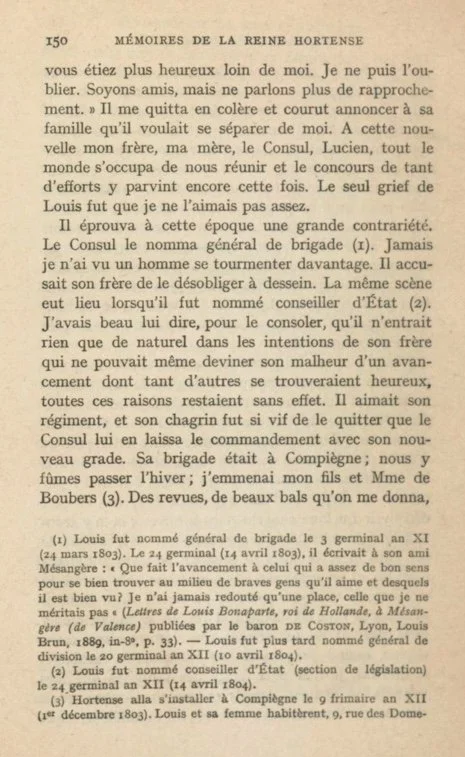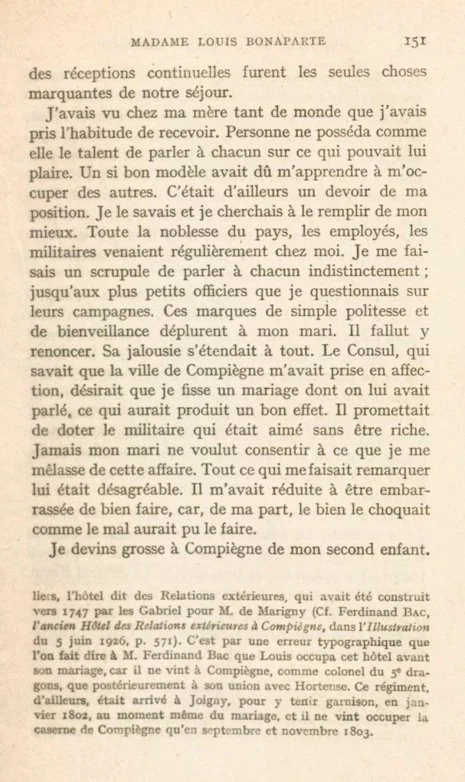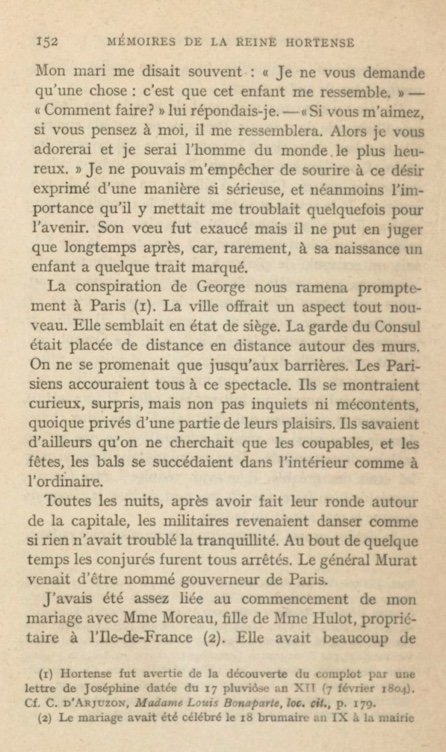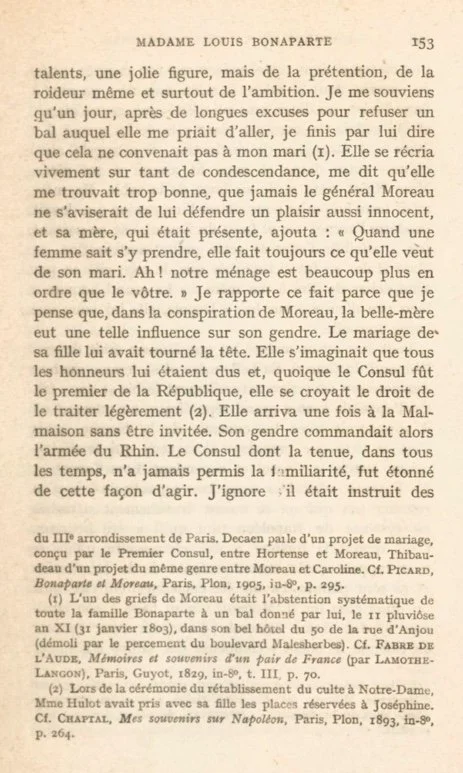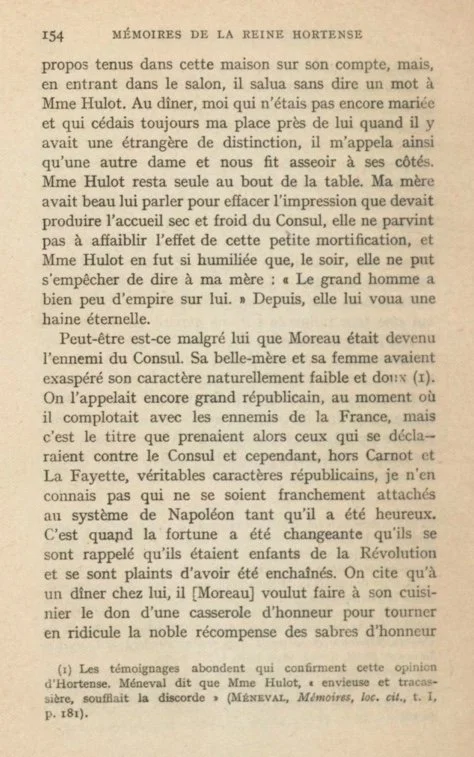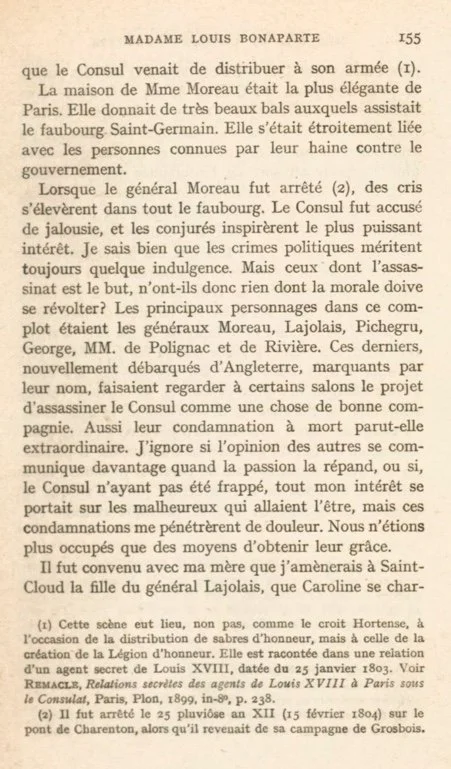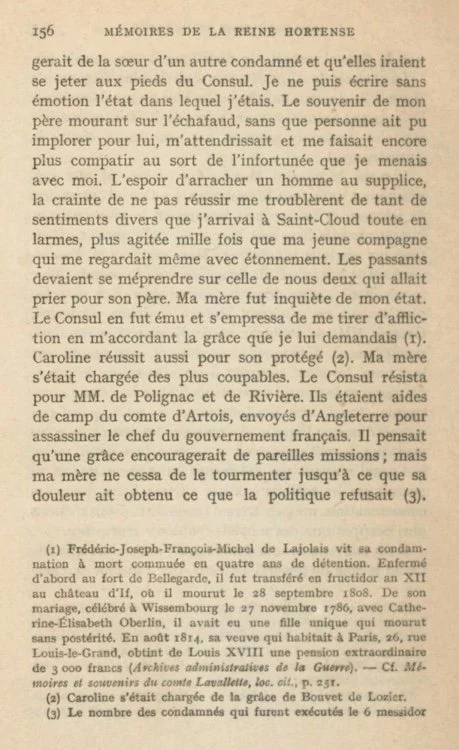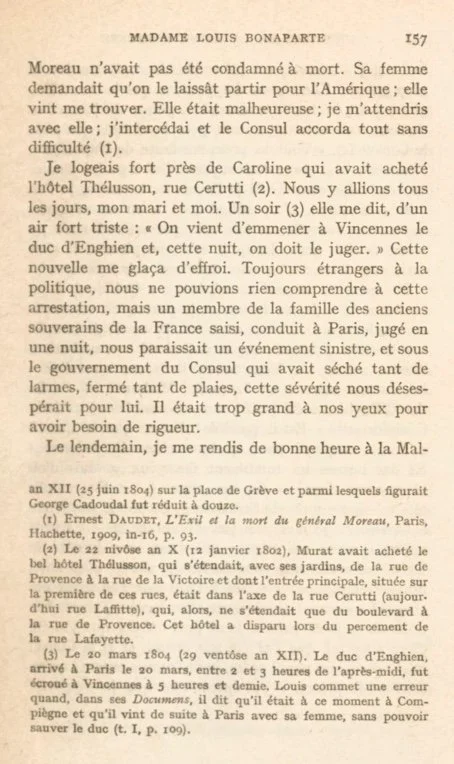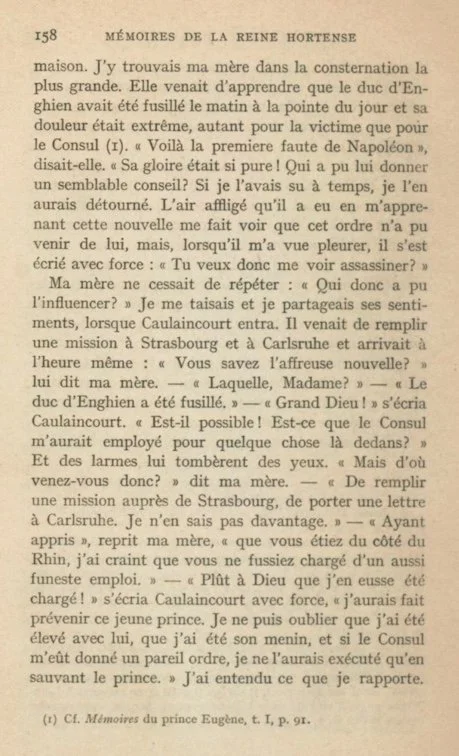Let’s have another look at Hortense’s Memoirs. If you want to read the book it is available for free at the side bar in English and French. Use the widget on the sidebar to translate the text below into pretty much any language.
In this excerpt, Napoleon has to deal with even more tricks and assassination attempts from malicious elements of the European oligarchy.
I [Hortense] was unable to obtain any explanation. I kept thinking how I was to behave, what explanation I could give my mother, who would certainly wish me to stay with her.
Finally, I thought I had found a way out. I arranged to take a great many lessons, so that all my mornings were occupied by my singing, my painting, my harp or my piano.
I went to dinner at Saint Cloud with my son, who never left me, and I returned in the evening in order not to miss my lesson the next morning. My mother did not dare object although several times she saw me drive off in very bad weather in spite of her entreaties that I remain.
It happened one day that the Consul while attempting to drive a six-horse coach met with an accident and was thrown a distance of twenty paces. My mother's alarm was so great that it upset her nerves.
She begged me to remain with her. What was I to do? Torn between the threats of my husband, the entreaties of my mother, between fear and filial duty, I did not know what decision to make when my mother burst into tears and exclaimed, "My daughter no longer loves me."
“It is easy enough to understand," added the Consul, "Hortense is enjoying herself in Paris. We are old, our company bores her." I was in agony. The thought that my mother could imagine that I no longer loved her and that I would sacrifice the joy of nursing her for some frivolous amusement was so utterly unbearable that I threw caution to the winds and told all about my husband's command.
What is that?" said the Consul standing up suddenly. "Your husband issued such an order? What can be his reasons for it? Does he get his information from the English slander sheets? Write him that a husband cannot separate a daughter from her mother. When her husband is away where is a wife's place if not beside her natural protector? A woman as blameless as you has the right to speak her mind firmly and not to accept such ridiculous restrictions."
It did not take long for me to become conscious of the mistake I had made in revealing my secret. On the one hand, the Consul's anger against Louis worried me dreadfully; on the other, my mother, who was incapable of keeping any of her feelings to herself, went about complaining to the ladies in waiting about Louis' strange idea of forbidding me to live near her. The public soon heard about it and drew its own conclusions.
People are never interested in the truth. The new and bizarre are what appeal to the crowd of idlers who make up society. My husband, who had word that I had not obeyed his orders, wrote me only cold, distant notes.
A journey through Belgium which my mother and the Consul undertook finally put an end to this painful situation. As they were leaving, two young men, members of the Tascher family and cousins of my mother, arrived from Martinique.
She did not have the slightest idea what to do with them and asked me to look after the new arrivals. I took care of the younger, who was not in good health. As for the older, who was already eighteen, I was prudent enough not to ask him to stay at our home. I already knew my husband's character too well.
The young man was housed in our old house and came to see me every day. The Consul's aides-de-camp, who on this occasion were leaving their young wives for the first time, confided them to my care with that confidence they always felt toward me. The ladies came and spent the day at my home regularly.
Their children, who were about the same age as mine, came with them and formed our principal topic of conversation. Frequently we would all go together to a play or for a walk, and afterwards each one would take her darling back with her. We also visited the suburbs of Paris [accompanied by Monsieur Auguié, the father of Adele, and my two cousins]. I felt myself so thoroughly responsible for the conduct of my young ladies that at a party given by Madame de Luray at Montmorency I ventured to blame one of them for her provocative attitude toward a young Russian who was trying to make himself too agreeable to all of us.
I reminded her of her husband, of her duties, and she listened to my advice as though it had been that of her mother. Indeed, never have gatherings been more innocent and pure than ours were; our only interests consisted in caring for our babies and receiving letters from the travelers.
I still possess the little account Colonel Savary wrote us describing all the receptions offered the Consul and my mother on their trip. The behavior and charm of these young women were so widely spoken of that they aroused the jealousy of certain Parisian beauties. Madame Hamelin, noted and feared for her biting wit, replied to someone who was praising the morals of the Consul's court, "What else can you expect? All these young women have just been married. They adore their husbands. There's little enough merit in that. Wait a few years before forming an opinion and then you may tell a different tale."
We were indignant on being told Madame Hamelin's prophecy. Each declared she would prove the cynic was mistaken. As a matter of fact, only one of the group ever was talked about, and she, I admit, was precisely the one who had been flirting at Montmorency.
The Consul and my mother returned from Belgium after having been received everywhere with demonstrations of great joy and enthusiasm. I continued dining daily with my son at the Tuileries.
The Consul made him sit in the middle of the table and let him touch everything. He gave him wine and coffee and though he frequently made the child cry by pinching his cheek or by kissing him too hard, he knew how to win his affection.
Every time the Consul entered the drawing-room my son would stretch out his arms toward him. This seemed to please my stepfather, and even when he was most preoccupied his face would brighten at the sight of his nephew. Once, when a morning reception was being held in my mother's apartment, where the ladies at that time were presented to the Consul before being admitted to one of the formal receptions, we waited several moments for him to come downstairs. My son was in his nurse's arms.
The Consul came in looking very preoccupied, which made us think that the conversation would not be a long one. My son, who was tired of staying in one spot, held out his arms. The Consul noticed this, took him from the nurse and continued to walk back and forth. We watched him. He seemed so absent-minded that we feared he would forget the precious burden he was carrying.
However, after a little while he handed the baby back to the nurse still without having said a word. Annoyed at being quiet once more the little boy began to cry and once more stretched out his arms. The Consul picked him up again, and this performance lasted half an hour without a word having been spoken.
Finally, a message came that the ambassadors were waiting. We entered the drawing-room. The Consul spoke a few words to the ladies, but he soon stepped up to Whitworth, the English Ambassador, and the entire room heard the bitter reproaches with which he assailed him.
He spoke of the treaties the English had violated, of the bad faith of the government. I cannot recall his expressions but the tone in which they were spoken made everyone silent with surprise and fear.
His anger had made him forget the presence of other people. My mother continued talking to the ladies and attempted to cover his voice by affectionate words in order to palliate the disagreeable effects she feared so violent a discussion would produce.
On his return to his study the Consul seemed to have shaken off a heavy burden. His anger had vanished. It was I and my mother who now looked worried.
“Well," he said, almost jokingly, "what is the matter? What has happened?" My mother reproved him gently, saying, "You frightened everybody. What will the ladies who did not know you, who had been so happy to have the opportunity to meet you, think of you now? Instead of being pleasant and polite to them, you insist on talking politics. It really wasn't the moment for that."
“Do you mean to say they heard me?" continued the Consul. "It's true I made a mistake. I did not want to come down today. Talleyrand had been telling me things that annoyed me, and then that long, lank idiot (Flandrin) of an ambassador stuck himself right under my nose."
All Paris heard of the scene that had just taken place. It marked the end of the peace. Hostilities were renewed shortly afterward.
By way of retaliation for the English having seized French frigates without warning the Consul gave orders to arrest all Englishmen who happened to be traveling in France and hold them as prisoners of war.
This action seemed so unfair to us that we were deeply grieved about it. We were not able to conceal from my stepfather our sorrow at seeing him act in such a way.
“You should have nothing to do with actions which are not just and noble," declared my mother. He took her in his arms and embraced her as he replied, "You are children both of you."
The Consul was more susceptible to criticism than he cared to admit. As he was in the habit of giving matters mature consideration before making any decision, the decision once made remained inflexible.
Yet, if his plans did not coincide with that narrow line of conduct which commands popular approval, they seemed to him to be unsatisfactory, and he attempted to remedy this weakness by assuming a very stern air. If his wishes were carried out, then the severer he had been before, the more gracious he became afterwards.
This was the moment to ask him for favors. For then he felt he could grant any request without appearing overindulgent, the one thing he was always afraid of. At such times, his one desire was to be obliging and to make you forget his severity.
My mother, who saw him one day in one of these good-natured moods, asked permission for a young Englishman [who had done our family some favors in Martinique to be allowed to remain in Paris.
He granted her request. Encouraged by her success, I in turn asked the Consul to intervene on behalf of another Englishman who, so I was told, was unhappy at being shut up at Fontainebleau.
Immediately both orders were written by Eugene, who happened to be present, and signed by the Consul himself. A fortunate incident in the case of our protegés, who were never afterwards disturbed in any way by the authorities.
Shortly afterwards, my husband returned from Montpellier, still cold towards me and giving me no reason for this attitude. This disagreeable state of things, regrettable and uncomfortable though it was, was still preferable to those continual reproaches which had disturbed my nights and saddened my days.
The love I felt toward my son was enough to fill my heart, nor did I any longer venture to complain of my fate since I had someone on whom I could shower my tender and boundless affection.
Had I been passionately in love with my husband, a little natural pride and self-respect might have made me accept for a long time the kind of life I was obliged to put up with. But the memory of his tears, the sad knowledge that I feared him instead of loving him made me unwilling to continue a state of things which was perhaps still more painful to him than to me. The more satisfied I felt at being left alone, the more I considered it my duty to try to meet him halfway. But what an effort it was to make the first step! What could I talk about to a man whose severe, cold manner seemed to be both a reproach and an indictment? The very vehemence of my repulsion gave me strength to overcome it.
Whenever I feel that a thing ought to be done, no matter what it may involve in the way of suffering for me, a violent impulse helps me to perform it. It was this that enabled me to approach my husband and tell him that he was risking both his happiness and my own, that his continual doubts as to my affection were both a mistake and an insult. The reluctance with which I took this step, my uneasiness of mind, all combined to make me shed tears which might have been attributed to unrequited affection.
The truth about Napoleon is so skewed in favor of vilifying Napoleon, that this fact is just as big of a story as the story of Napoleon himself.
Louis was touched, nevertheless he replied, "We shall remain apart. I am happier like that." I do not know what was going on in his mind, but in spite of the tenderness he displayed he hurried off, seemingly extremely agitated. I remained alone, as pleased with myself as if I had performed the most heroic deed that has ever been accomplished. My conscience was at rest.
Agents work together to vilify the honest but they are the ones committing the crime of mass fraud.
It’s up to us to make sure what they do stops working for them.
No longer could I be held responsible for our disagreements. When I saw my husband the next day, I astonished him by my calmness. He kept glancing at me frequently, expecting to find some trace of sorrow on my face, but all he could see there was the serenity that comes from a clear conscience.
Busying myself continually with my son, I laughed and danced about with him and did not appear more chagrined in any way than before we had had our talk. Several days passed. Finally, Louis announced to me that his mind was made up and he wished to be reconciled with me. At the time this only appeared strange to me, but since then, having become familiar with his unfortunate, constantly distrustful state of mind, I realize that my advances had aroused suspicions which my subsequent calmness had dispelled. "You assured me," " I replied, "you were happy away from me. I cannot forget this. Let us be friends but do not talk of a reconciliation."
He left me angrily and hastened to announce to his family that he wished a divorce. When they heard this piece of news, my brother, my mother, the Consul, Lucien, everybody sought to bring us together again, and thanks to their combined efforts a reconciliation was once more arrived at. Louis' only just cause for complaint was that I did not love him sufficiently.
He was greatly annoyed at an event which took place about this time—his appointment as brigadier general. I have never seen a man worry so much about anything as Louis did about this matter.
He kept accusing his brother of offending him on purpose. The same scene took place when he was made a member of the Council of State. It was useless for me to point out, by way of consolation, that it was quite natural for his brother to act as he did, nor could the latter be expected to realize that Louis would dislike a promotion which would have delighted so many other men.
All these arguments had no effect. He was fond of the regiment which he commanded and was so deeply grieved at the idea of leaving it that the Consul allowed him to remain in command in spite of his new rank. His brigade was stationed at Compiegne and it was there we went to spend the winter.
I took with me my son and Madame de Boubers. The reviews, the beautiful balls, the receptions which were given in my honor were the only notable incidents of our stay.
I had been so much in the habit of seeing my mother entertain at our house that I was accustomed to act as hostess. No one compared with her in the art of making some pleasant, appropriate remark to each guest. With such a good model before me, I had learned how to attend to other people's enjoyment. To do so, indeed, was one of the duties of my position.
I realized the fact and tried to perform my task to the best of my ability. All the local nobility, the government officials and the military authorities called on me regularly. I made a point of speaking to each guest without making any distinctions, questioning even the minor officers about their campaigns.
These acts of mere politeness displeased my husband. I was obliged to refrain from them. The Consul knew that I was popular at Compiegne. He wished me to arrange a marriage which he had heard talked about. A thing like that would have produced a good effect.
The Consul was prepared to offer the dowry himself. The bridegroom was to be some soldier who had won a girl's heart in spite of his lack of wealth. My husband would never let me have anything to do with this matter. He disliked everything that made me conspicuous. His attitude made me feel uncomfortable even when I was doing good, for a good action on my part shocked him as much as another's misdeed.
While we were at Compiegne, I was expecting my second child. Louis often said to me, "I ask only one thing, to have this baby look like me."
“What can I do about that?" I would reply.
"If you loved me, if you thought often enough about me, he would look like me. Then I would adore you and be the happiest man in all the world." I could not help smiling at the solemn manner in which this was expressed, nevertheless the importance he attached to it sometimes worried me in view of the future.
However, his wish was fulfilled, but he was not able to realize it till much later, for it is unusual for a child at birth to have any clearly defined resemblance to anyone.
The conspiracy of George made us return suddenly to Paris. The city wore a new aspect. It seemed as though it had been placed under martial law. The Consul's guards were stationed at intervals around the walls. People did not go walking beyond the gates. The Parisians were interested in the new state of things. They were curious, surprised, but neither alarmed nor displeased although the new rules deprived them of some of their usual amusements.
They were aware that only the conspirators were being sought by the police. In town, receptions and balls followed one another as usual. Every night after having made their tour of inspection, the officers came back and danced as though nothing were disturbing the public peace. After a time all the conspirators had been arrested. General Murat had just been made military governor of Paris. Shortly after my marriage, I had been fairly intimate with Madame Moreau, the daughter of Madame Hulot, who owned property in Ile de France.
She was pretty and gifted but rather affected and even stiff in her manner. Her chief characteristic was her ambition. I remember one day how after making numerous excuses for refusing an invitation to a ball which she was urging me to attend, I finally told her that my husband would not care to have me go.
She expressed her surprise at such a submissive attitude and declared she thought I was wrong in being so obedient, that it would never occur to General Moreau to forbid her such an innocent form of amusement.
Her mother, who was present, added, "When a woman knows how to manage matters, she can make her husband do as she likes. Ah, our household is better run than yours is, that's evident."
This should prove just how little the truth has to do with the stories they pay all of those agents to tell us.
I mention this remark because I believe that in Moreau's conspiracy the General was influenced by his mother-in-law. Her daughter's marriage had turned Madame Hulot's head. She fancied that he was entitled to all the honors that were to be had.
Although the Consul was the leading citizen of the Republic, she felt in a position to treat him disdainfully.
Once she came to Malmaison without having been invited. Her son-in-law at the time was in command of the army on the Rhine. The Consul, whose attitude never lent itself to any familiarities, was astonished by this conduct. I do not know whether he knew of the remarks made about him in Moreau's household, but when he entered the drawing-room he merely bowed to Madame Hulot without speaking to her.
At dinner where I, not yet being married, was in the habit of giving up my seat beside my stepfather to any distinguished guest, he asked me and another lady to sit on either side of him.
If the internet was intended as a big trap for us then we should use it to expose them.
Justice.
Madame Hulot remained alone at the end of the table. Although my mother spoke to her frequently and attempted to dispel the unpleasant effect of the Consul's chilling reception, she did not succeed.
Madame Hulot was so vexed that in the evening she could not refrain from saying, "The great man really has very little control over his feelings."
From that day on, she hated the Consul. Perhaps it was in spite of himself that Moreau became my stepfather's enemy. His mother-in-law and his wife had played upon his naturally weak and yielding nature. He had the reputation of being a stanch supporter of the Republic at a time when, as a matter of fact, he was conspiring with the enemies of France.
This reputation was shared by those hostile to the Consul, and yet, with the exception of Carnot and Lafayette, who were really sincere in their devotion to the republican form of government, I did not know of any so-called republicans who did not rally to support his cause so long as it was successful. It was when changes threatened that they remembered they were sons of the Revolution and complained of having been enslaved.
An example of the mentality of Napoleon's enemies may be seen in the case of Moreau when he declared he would present his cook a "saucepan of honor" to ridicule the Consul's fine gesture when he distributed "swords of honor" among his troops."
The receptions of Madame Moreau were reputed to be the most fashionable in Paris. She gave sumptuous balls which were attended by all the nobility of the Faubourg Saint Germain, and was on intimate terms with persons known to hate the existing government. When General Moreau was arrested, cries of indignation were raised throughout the Faubourg. The Consul was accused of being jealous of his ability, and the conspirators found many sympathizers.
I am well aware that political crimes always deserve a certain amount of indulgence. But surely our moral sense must refuse to condone those which involve the assassination of a human being.
Moreau was a traitor to his native France.
The principal persons involved in this conspiracy were the Generals Moreau, Lajolais, Pichegru, George, and Messieurs de Polignac and de Riviere. The two last, just back from England and prominent on account of their families, talked as if the killing of the Consul were something any gentleman should take part in.
This view prevailed in a number of salons. Consequently, their death sentence was received with astonishment. Perhaps opinions held by sincere fanatics are especially contagious, or perhaps the fact that the Consul was safe caused me to pity those who were about to die. At any rate, the sentences pronounced filled me with grief. Our every thought was how we might secure their repeal. It was agreed that I should take the daughter of General Lajolais to Saint Cloud with me, while Caroline did the same with the sister of another of the condemned men.
The two girls were to throw themselves at the feet of the Consul and plead for the culprit. I cannot yet describe without emotion the feeling that oppressed me. The memory of my father's death on the scaffold, with no one intervening on his behalf, haunted me and made me pity yet more the unfortunate girl who accompanied me.
The hope of saving a man from such a fate, the fear of failure moved me to such an extent that when we arrived at Saint Cloud, I was all in tears, a thousand times more wrought up than my young companion, who looked at me in astonishment. Passers-by might indeed have made a mistake as to which of us was about to plead for her father's life. My mother was worried as to the effect these scenes would have on my health. The Consul was touched and hastened to my prayer. Caroline was also successful with her protegé. My mother had taken upon herself the defense of those who were the most guilty. The Consul resisted in the case of Messieurs de Polignac and de Riviere.
The Count d’Artois was frequently associated with plots to murder Napoleon. It’s likely he was behind the murder of Napoleon and then this aristocrat got to become a puppet ruler of France until he was finally overthrown.
They had been the aides-de-camp of the Comte d'Artois and were especially sent from England to assassinate the head of the French Government. He thought that clemency in this instance would encourage similar expeditions in the future.
My mother, however, kept bringing up the matter until her very evident grief obtained what his political wisdom refused. Moreau had not been condemned to death.
His wife begged that he be allowed to go to America and came to see me about this. She was unhappy, I pitied her distress, and the Consul agreed to everything without raising any objections.
My house was very close to that of Caroline, who had bought the Thelusson mansion in the rue Cerutti. My husband and I went there every day. One evening Caroline said to me sadly, "They have just taken the Duc d'Enghien to the fortress of Vincennes. His trial will take place tonight."
This news chilled me with horror. Kept in ignorance of all political happenings, we could not understand the reasons for this arrest. Nevertheless, the fact that a member of the former French royal family should have been kidnaped, brought to Paris, and tried by night seemed to us a sinister event.
That this act of severity should take place under the rule of the Consul who had dried so many tears, bound up so many wounds, filled us with grief on his account. To us Bonaparte seemed too great to be obliged to do things of this sort. The next day I went to Malmaison early. I found my mother overcome with alarm.
She had just heard that the Duc d'Enghien had been shot that morning at daybreak. Her grief was intense, not only for the victim but also for the Consul.
“This is the first mistake Napoleon has made," she said. "Till now his fame has been so stainless. Who can have advised him to do this? Had I known of it soon enough, I should have prevented him. His sorrowful air when he told me the news proved to me that it was not he who had given the order.
When he saw my tears he exclaimed vehemently, “do you want to see me assassinated?'
“My mother kept repeating over and over again, "Who can have influenced him?" I said nothing and shared her emotions.
The original French is available below:

